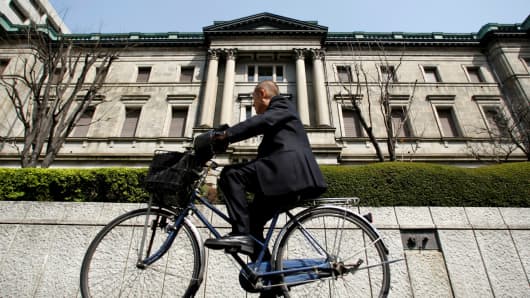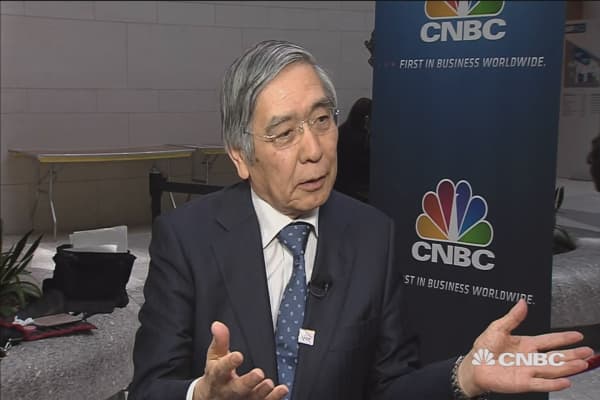The Bank of Japan will be able to begin winding down its extraordinary monetary stimulus within the next five years, the head of the central bank said.
“Sometime within the next five years, we will reach [our] 2 percent inflation target,” Governor Haruhiko Kuroda told CNBC’s Sara Eisen over the weekend. Once that level is reached, we will start “discussing how to gradually normalize the monetary condition.”
Kuroda began his second five-year term this year. He has implemented a massive stimulus policy by cutting the central bank’s benchmark interest rate to negative, keeping the 10-year Japanese government bond yield near 0 percent in an effort to control the yield curve and stepping up the Bank of Japan’s asset purchases.
However, inflation remains low. Japan reported its consumer price index, excluding fresh food and energy, rose half a percent in the 12 months through March.
“In order to reach [our] 2 percent inflation target, I think the Bank of Japan must continue very strong accommodative monetary policy for some time,” Kuroda added in his interview with CNBC.
Japan’s efforts to boost the sluggish national economy come amid steady growth around the world. The International Monetary Fund predicts the global economy will increase 3.9 percent this year and next.
Kuroda agreed with the positive outlook. “The world economy will continue to grow at a relatively high pace,” he said. For this year and next, “we don’t see any sign of a turning point.”
But protectionism, unexpected rapid tightening of monetary policy in some countries, and geopolitical tensions in North Korea and the Middle East pose potential risks, Kuroda said.
The election of President Donald Trump in the U.S. and political tensions in Europe in the last two years marked a push back against globalization, which some say has exacerbated issues such as income inequality.
Notably, Trump withdrew the U.S. from the 12-nation Trans-Pacific Partnership deal on his first full day in office. The administration’s position remains the same, despite some talk in the last few weeks that Trump was reconsidering the deal.
Japan still advocates TPP and hopes the U.S. will join, Kuroda said. “I think that is still a priority of [the] Japanese government.”
The country is also not manipulating its currency in order to gain a trade advantage, he said. “If anything, [the] Japanese Yen, from time to time, appreciate[s] too much.”
The yen traded near 108 against the greenback Monday morning, the Japanese currency’s weakest level versus the dollar in more than two months.





